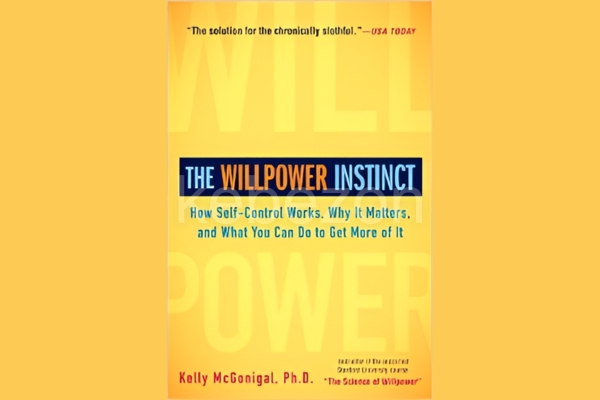The Willpower Instinct: How Self-Control Works, Why It Matters, and What You Can Do to Get More of It – Kelly McGonigal
5,00 $
You may check content proof of “The Willpower Instinct: How Self-Control Works, Why It Matters, and What You Can Do to Get More of It – Kelly McGonigal” below:

The Willpower Instinct: How Self-Control Works, Why It Matters, and What You Can Do to Get More of It
In “The Willpower Instinct: How Self-Control Works, Why It Matters, and What You Can Do to Get More of It,” Kelly McGonigal delves into the intricate world of willpower. She not only dissects the meaning of self-control but also provides actionable insights on enhancing it. In an age where instant gratification lurks around every corner, the need to cultivate willpower has never been more critical. Whether it’s resisting the temptation of fast food during a diet or mustering the energy to maintain a workout regimen, the ability to exercise self-control is vital.
McGonigal foregrounds willpower as an innate human asset but also a skill that can be developed with practice and understanding. With a blend of scientific research and relatable anecdotes, the book chronicles the biological, psychological, and practical aspects of willpower, underlining its significance in achieving long-term goals. From controlling impulses to meeting personal aspirations, mastering willpower is a journey well worth the endeavor. Let’s begin to unpack the layers of willpower through McGonigal’s framework and understand how we can foster more self-control in our lives.
Understanding Willpower
Willpower can be likened to a muscle; it requires exercise to become strong yet can fatigue with overuse. At its core, willpower operates through three primary aspects: “I Will,” “I Won’t,” and “I Want.” The nuance in understanding these dimensions lies in recognizing how they interplay in our daily lives.
“I Will” signifies the commitment to take action toward specific goals, like exercising regularly or saving money for a planned vacation. Much like setting foot in a gym for the first time, the commitment itself opens doors to opportunities often overshadowed by procrastination.
Contrarily, “I Won’t” embodies the skill of resistance declining distractions and temptations that deter us from our goals. The nature of our world filled with fast food restaurants and endless scrolling on social media makes this dimension crucial. It’s akin to navigating a busy street while focusing intently on a destination ahead.
Lastly, “I Want” connects our immediate actions to our long-term desires and values. It emphasizes the importance of intrinsic motivation. When what we want aligns with our core values, our dedication becomes more resilient against temptations.
To underscore the significance of cultivating each dimension, consider a simple table below to encapsulate these components:
| Dimension | Description | Example |
| I Will | Commitment to actions | Deciding to join a gym and work out three times a week |
| I Won’t | Ability to resist temptations | Choosing not to snack on junk food during a movie |
| I Want | Aligning actions with values | Wanting to be healthy to enjoy life fully |
By grasping this framework, we enhance our likelihood of making conscious choices that bolster our self-control. Understanding willpower as a complex interplay of commitments, resistance, and motivations is the first step toward harnessing it effectively.
The Three Powers of Willpower: I Will, I Won’t, I Want
In “The Willpower Instinct,” McGonigal breaks down willpower into three distinctive powers: “I Will,” “I Won’t,” and “I Want.” Each power holds an essential role in shaping our behavior and steering us toward our long-term aspirations.
“I Will” concerns the commitment to perform actions aimed at achieving specific goals. When we proclaim “I will,” we signify our intention to undertake steps, however small, that align with our desired outcomes. For example, setting aside time to study each day for an upcoming exam can initiate a path toward academic success. This aspect is often grounded in the establishment of habits; a well-defined habit allows for automatic action where less mental energy is required to take action.
“I Won’t” represents our capacity to avoid distractions and temptations. Resisting short-term pleasures often requires a robust sense of discipline, akin to a soldier shielding the fortress against invading forces. An excellent example is the decision to turn down dessert when trying to maintain a healthy lifestyle. McGonigal emphasizes the need for strategies that bolster this aspect of willpower, such as removing temptations from one’s environment.
“I Want” delves deeply into the underlying motivations that drive our actions. When we strive for a future goal, it’s essential to connect that goal with what we truly desire. A clear understanding of why we want to achieve certain things can be a powerful motivator; it infuses drive into our actions. For instance, rather than merely pursuing fitness, one might envision a healthier lifestyle that allows for family adventures or an active retirement.
To better comprehend these three powers, here’s a list summarizing their functions:
- I Will
- Represents proactive commitment.
- Establishes routines and habits.
- Drives action towards goals.
- I Won’t
- Facilitates resistance against distractions.
- Develops discipline in the face of temptation.
- Protects long-term interests over short-term gains.
- I Want
- Aligns actions with core values.
- Enhances intrinsic motivation.
- Encourages clarity in goal-setting.
Ultimately, harnessing these three aspects empowers us to achieve our objectives, fend off distractions, and create a deeper connection to our desires. When balanced appropriately, they create a robust framework for effective self-control.
Biological Basis of Self-Control
Understanding the biological basis of self-control is crucial in grasping why willpower can fluctuate and how it is effectively harnessed. McGonigal posits that willpower has a strong scientific foundation, influenced by brain function, hormones, and physiological states, primarily glucose levels.
- Neurobiological Mechanisms: Willpower cannot be fully embodied without acknowledging its roots in neurobiology. The prefrontal cortex the brain’s executive center plays a critical role in regulating behavior and decision-making. Individuals showcasing heightened self-control demonstrate increased activity in this area when faced with tasks requiring impulse control. In contrast, those with lower self-control exhibit elevated responses from the ventral striatum, which is associated with craving and reward. This distinction highlights the need for targeted activities that strengthen this executive functioning.
- Glucose as a Resource: Research indicates that engaging in self-control tasks depletes glucose levels in the brain. Glucose is the body’s primary source of energy, and without it, maintaining focus becomes increasingly difficult. This depletion can lead to moments of weakness, making it crucial to replenish energy levels through proper nutrition. Regular meals and healthy snacks ensure that the brain has access to the energy needed for sustained self-control.
- Stress and Self-Control: The relationship between stress and self-control cannot be overstated. Stress triggers a cascade of biochemical reactions, including the release of cortisol, which can impair cognitive functions related to self-control. When people experience high stress, the tendency to resort to unhealthy coping mechanisms like emotional eating can become prevalent. McGonigal emphasizes the importance of recognizing stressors and their potential to deplete our willpower, advocating for stress-management techniques to bolster self-regulation.
- Self-Control as a Trainable Skill: Perhaps the most empowering aspect McGonigal discusses is the view of self-control as a trainable skill rather than just an inherent trait. Practices such as mindfulness, structured goal-setting, and cognitive reframing can enhance one’s ability to manage impulses over time. Effective self-control is therefore not a static quality but can be developed through intention and practice.
In summary, the biological underpinnings of self-control illustrate the complex interplay between brain function, physiological resources, and psychological influences. Armed with this knowledge, we better equip ourselves for understanding our behaviors and refining our strategies for effective self-regulation.
The Role of Stress in Self-Control
Stress plays a substantial role in self-control, influencing not just our psychological state but also our biological responses. McGonigal sheds light on how stress interacts with our willpower in ways that can either fortify or undermine our self-regulatory efforts.
- Impact of Stress on Decision-Making: Stress can significantly impair cognitive functions, making it difficult to weigh options rationally. Under stress, individuals often revert to impulsive behaviors instead of engaging in thoughtful decision-making. For instance, when faced with work deadlines, one might reach for a sugary snack for an instant energy boost, sacrificing the long-term goal of healthy eating.
- Physiological Responses: High levels of stress lead to the overproduction of cortisol, a hormone that, while necessary for quick reactions, can be detrimental when chronically elevated. Elevated cortisol levels can lead to diminished self-control; individuals may find it increasingly challenging to resist immediate temptations when already under stress. McGonigal notes that chronic stress can create a vicious cycle, leading to emotional eating or substance use as coping mechanisms, which ultimately undermine the efforts to regain self-control.
- Stress Management Techniques: To counteract the negative effects of stress on self-control, McGonigal emphasizes the importance of incorporating relaxation techniques and stress management strategies into daily routines. Activities such as mindfulness meditation, physical exercise, and adequate sleep can significantly reduce stress levels and enhance self-regulatory capacities. With a calmer mind and a more relaxed state, individuals are better positioned to make decisions that align with their long-term goals.
- Reframing Stress: Furthermore, McGonigal suggests that reframing stress as a challenge rather than a threat can alter its impact on self-control. Viewing stress as a catalyst for growth can empower individuals to confront challenges head-on rather than succumb to impulsive behaviors. This shift in perspective fosters a proactive approach to stress management, reinforcing self-discipline.
By acknowledging the significant role stress plays in self-control, we cultivate a deeper understanding of how to navigate life’s challenges effectively. Techniques for recognizing, managing, and reframing stress can lead to improved self-regulation and greater resilience in achieving long-term goals.
The Science Behind Self-Control
The science of self-control extends beyond individual willpower; it encompasses a complex interplay of cognitive, emotional, and social dynamics. Understanding these mechanisms can empower individuals to enhance their self-control, leading to improved well-being and goal achievement.
- Cognitive Mechanisms: Cognitive processes underpinning self-control highlight how individuals make decisions under varying conditions. Emotional and social influences can complicate these cognitive processes, leading to impulsive choices. McGonigal illustrates that willpower is akin to a muscle that can be trained but risks fatigue through overuse, a phenomenon known as ego depletion. Since self-control resources can become exhausted, understanding this limitation allows for strategic planning to preserve willpower.
- Emotional Factors: Emotions significantly impact self-control, shaping our immediate reactions. McGonigal underscores the importance of emotional awareness acknowledging feelings without judgment can help individuals manage impulses better. When people experience negative emotions such as anxiety or frustration, they may be more inclined to seek comfort in instant gratifications like unhealthy snacks or distractions, undermining long-term goals.
- Social Influences: The social environment plays a critical role in self-control, as behaviors and attitudes can be contagious. Engaging with peers who demonstrate strong self-control can nurture an individual’s commitment to their goals. This phenomenon is known as social proof, where the behaviors of those around us can either propel us towards our aspirations or pull us away from them. McGonigal advocates for surrounding oneself with supportive individuals to cultivate a positive influence.
- Practical Applications: McGonigal emphasizes practical applications, encouraging individuals to implement structured strategies that bolster self-control abilities. Techniques such as mindfulness practices, clear goal-setting frameworks, and accountability mechanisms can enhance self-regulation. Moreover, understanding the interconnectedness of cognitive, emotional, and social factors can lead to a more holistic approach to enhancing self-control.
By integrating the science behind self-control, individuals can take proactive steps to foster self-discipline, leading to better management of impulses and the achievement of long-term objectives.
Research Insights on Willpower
Research insights into willpower provide a data-driven understanding of how self-control operates and the significance it holds in various aspects of life. McGonigal integrates findings from psychology, neuroscience, and behavioral science to shed light on self-regulation and the ways to strengthen it.
- Self-Control as a Predictor of Success: Numerous studies indicate that self-control is a strong predictor of success, spanning academic achievements, career advancement, and health outcomes. Individuals with higher self-control demonstrate a greater ability to resist short-term distractions, which correlates positively with their long-term accomplishments. This predictive power emphasizes the importance of cultivating self-control as a cornerstone of achieving personal and professional goals.
- Ego Depletion Theory: The concept of ego depletion, which suggests that exerting willpower draws from a finite resource, has been a fundamental finding in self-control research. McGonigal discusses how willpower can be told to ebb and flow depending on prior exertion. When individuals use their willpower on one task, they may find it harder to resist temptations later on, implying the need for planned breaks or replenishment of self-control reserves.
- Mindfulness and Self-Control: Research supports the efficacy of mindfulness practices in enhancing self-control. Studies reveal that individuals who regularly engage in mindfulness exercises exhibit higher levels of self-regulation. Mindfulness enhances awareness of impulses, allowing individuals to respond thoughtfully rather than react automatically. This skill affords individuals greater agency in aligning their actions with their goals.
- Social Identity and Self-Control: Additionally, research indicates that individuals who identify strongly with a community that prioritizes self-control such as a fitness group or study cohort tend to exhibit enhanced self-regulation. The collective commitment can spur motivation and adherence to personal goals. Having others to share experiences with helps reinforce accountability and resilience in the face of temptations.
- Longitudinal Studies: Longitudinal studies further support that individuals who develop self-control early on tend to maintain better outcomes throughout their lives. This suggests that investing time and effort into cultivating self-control can lead to lasting changes that affect quality of life in meaningful ways.
The findings bolster McGonigal’s assertions that willpower matters profoundly. By integrating scientific research into practical applications, individuals can foster their self-control to achieve their desired life outcomes successfully.
Psychology of Instant Gratification
The psychology of instant gratification intricately ties to willpower and self-control. Understanding this concept allows individuals to combat the allure of immediate rewards and focus on long-term goals.
- Immediate vs. Delayed Gratification: The desire for immediate satisfaction often clashes with pursuits that require delayed gratification. McGonigal delves into the brain’s reward circuitry, particularly how the ventral striatum lights up when individuals are faced with instant rewards. This neural response underscores the innate pull towards immediate pleasures, whether it’s a sugary snack or an urge to scroll through social media.
- Self-Control and Decision-Making: The distinction between immediate and delayed gratification illustrates the importance of self-control in decision-making processes. Individuals often find themselves at a crossroads where immediate desires clash with long-term aspirations. McGonigal emphasizes that willpower enables individuals to opt for behaviors leading to better outcomes, although they may require waiting or exerting effort.
- Cognitive Reframing: To combat instant gratification, McGonigal recommends cognitive reframing the process of altering how one perceives temptation. Instead of fixating on the temporary pleasure of indulging in a treat, individuals can visualize the benefits of exercising self-control. This shift promotes the allure of future rewards over transient ones.
- Habit Formation: By forming habits that prioritize long-term goals over fleeting pleasures, individuals can effectively counter the constant pull of instant gratification. For instance, adopting a routine where one takes a walk after dinner can mitigate the desire to snack compulsively.
- Emotional Regulation: Ultimately, managing emotions serves as a pivotal strategy. Impulse control becomes easier when one develops awareness of emotional triggers that lead to succumbing to instant gratification. McGonigal suggests practicing mindfulness to create space between impulse and action, fostering healthier decision-making and aligning behaviors with personal aspirations.
Understanding the psychological mechanisms behind instant gratification allows individuals to constructively engage with their impulses, enhancing their self-control and ultimately working towards their long-term goals.
Neuroeconomics and Decision Making
Neuroeconomics an interdisciplinary field integrating neuroscience, psychology, and economics provides insightful perspectives on how decisions are made, particularly concerning self-control. McGonigal explores these dimensions to highlight the cognitive processes underlying willpower and reward systems.
- Reward Processing: Neural circuitry involved in decision-making reveals the allure of immediate rewards. The ventral striatum, which responds to anticipated rewards, tends to activate powerfully in impulse-driven decisions. McGonigal posits that the brain’s reward pathways can lead individuals toward choices that prioritize short-term pleasure over long-term gains.
- Emotional Influences: Emotions significantly affect decision-making. When individuals are faced with stress or anxiety, their capacity to make rational, self-controlled decisions often diminishes. Understanding that emotional states can cloud judgment highlights the importance of managing feelings effectively to maintain focus on long-term objectives.
- Temporal Discounting: The principle of temporal discounting explains the tendency of individuals to value immediate outcomes more greatly than those in the future. McGonigal cites research indicating that, unless intentional efforts are made, individuals are prone to discount future rewards, reinforcing the need for strategies that cultivate willpower.
- Framing Effects: Neuroeconomics also examines how choices are framed and presented, which can influence decision outcomes. When individuals view a situation in terms of gains or losses, their willingness to delay gratification can change dramatically. McGonigal asserts that reframing decisions presenting the long-term options positively can bolster self-control.
- Precommitment Strategies: Understanding these decision-making processes encourages individuals to adopt precommitment strategies decisions made in advance to lock in future behavior. By establishing rules or commitments, people can navigate temptations more effectively and align actions with desired outcomes.
By integrating neuroeconomic insights with practical strategies, individuals can enhance their self-control and make informed decisions that foster long-term success.
Practical Strategies for Improving Self-Control
Practical strategies provide the groundwork for improving self-control and translating insights into actionable steps. McGonigal’s recommendations prioritize sustainable techniques that yield lasting results.
- Understand Willpower as a Limited Resource: Recognize that willpower can become fatigued over time. It’s vital to manage self-control needs, allowing for breaks and recovery periods. Knowing when to focus energy and when to rest can help preserve self-regulatory capacities.
- Set Clear Goals: Define specific, measurable, and achievable objectives using the SMART framework. Having clear goals can streamline decision-making processes and encourage persistence when faced with temptations.
- Practice Mindfulness: Engaging in mindfulness practices enhances awareness of impulses. Spending time in quiet reflection or meditation can significantly improve self-control by enabling individuals to process reactions mindfully.
- Use Implementation Intentions: Creating “if-then” strategies can help individuals prepare for tempting situations. For instance, stating, “If I feel the urge to snack, then I will drink a glass of water first” encourages proactive decision-making and reduces impulsive behavior.
- Limit Temptations: Remove unnecessary distractions and temptations from the environment. If unhealthy snacks are not readily accessible, individuals are less likely to indulge in them, promoting healthier choices.
- Practice Delayed Gratification: Gradually increase the time between desire and satisfaction. Continually delaying gratification can strengthen self-control abilities over time, making it easier to resist immediate temptations for longer-lasting rewards.
By integrating these practical strategies into daily routines, individuals can significantly enhance their self-control, allowing them to make choices that align more closely with their long-term goals.
Breathing Techniques for Self-Control
Breathing techniques serve as a powerful mechanism for enhancing self-control. McGonigal suggests that incorporating structured breathing exercises into daily routines can provide immediate relief and support self-regulation efforts.
- Deep Breathing: Engaging in deep, slow breaths can activate the parasympathetic nervous system, promoting relaxation and reducing impulsive reactions. Techniques such as the 4-7-8 method involve inhaling for 4 seconds, holding for 7, and exhaling for 8 to induce calmness.
- Mindful Breathing: Focusing on one’s breath allows for greater mindfulness and presence, contributing to improved self-awareness. Taking dedicated moments to engage in mindful breathing can facilitate a clearer mindset when faced with temptations.
- Pursed Lip Breathing: This technique entails inhaling through the nose and exhaling slowly through pursed lips. It helps calm anxiety and fosters concentration, making it easier to confront urges.
- Alternate Nostril Breathing: Commonly practiced in yoga, this technique balances the body’s energy through controlled breathing. Alternating nostril breathing may contribute to emotional stability, enhancing self-control in stressful scenarios.
- Box Breathing: Box breathing, or equal breathing, involves inhaling, holding, exhaling, and holding each for an equal count (usually 4). This rhythmic practice can increase focus and reduce stress, empowering individuals to better manage impulses.
- Humming Bee Breath (Bhramari): This technique generates a calming hum while exhaling, which can ground focus and tranquility, making it easier to maintain self-control against temptations.
By incorporating these breathing techniques into daily routines, individuals can improve their self-control and wellbeing, fostering a state of mind that aligns with their long-term goals.
The Importance of Relaxation Techniques
Relaxation techniques serve as a vital tool in enhancing self-control. McGonigal outlines how practicing relaxation can affect overall well-being and improve the ability to set and track goals effectively.
- Physiological Benefits: Engaging in relaxation techniques can help lower stress hormone levels and decrease blood pressure. Reducing physiological tension allows individuals to respond more thoughtfully to temptations rather than react impulsively.
- Mental Clarity: Relaxation exercises promote mental clarity, improving focus and decision-making. A calm mind enhances the ability to assess choices rationally, particularly in critical moments when self-control is challenged.
- Emotional Regulation: Techniques such as deep breathing or progressive muscle relaxation can help individuals manage anxiety, leading to heightened self-regulation. A balanced emotional state aids in resisting immediate impulses.
- Types of Relaxation Techniques:
- Deep Breathing: Regularly incorporating deep breathing can alleviate stress and foster groundedness, making it easier to confront cravings or distractions.
- Progressive Muscle Relaxation (PMR): Systematically tensing and relaxing muscle groups promotes heightened awareness of physical and emotional states, enhancing self-control.
- Mindfulness Meditation: Mindfulness empowers individuals to observe thoughts and cravings without judgment, fostering improved impulse control.
- Setting and Tracking Goals: The interplay between relaxation and goal-setting enhances self-control. Setting clear, actionable goals not only provides clarity but also motivates individuals to exercise restraint. Incorporating relaxation techniques during goal-setting sessions recalibrates mental states, increasing alignment with objectives.
By acknowledging the importance of relaxation techniques and embedding them into daily practices, individuals can enhance self-control, paving the way for significant personal growth and goal achievement.
Setting and Tracking Goals
Setting and tracking goals is a fundamental practice that underpins effective self-control. McGonigal emphasizes the necessity of goal-oriented behavior for maintaining focus and discipline over time.
- Specific and Measurable Goals: One of the keys to effective goal-setting is to establish well-defined objectives that are both specific and measurable. Utilizing the SMART criteria ensures clarity and accountability, promoting a higher likelihood of successful outcomes.
- Breaking Goals Down: Large goals can feel overwhelming, so breaking them down into smaller, manageable pieces allows progress to feel more achievable. Each small step completed reinforces self-control and instills confidence, enhancing motivation.
- Implementation Intentions: Incorporating “if-then” strategies helps to pre-determine responses to potential distractions. For instance, if a goal is to exercise three times a week, a person might state, “If I feel lazy, then I will put on my workout clothes to initiate the process.” This advance planning creates mental pathways to action.
- Progress Monitoring: Regularly tracking progress reinforces the connection between effort and results, aiding motivation. Utilizing journals, charts, or apps allows individuals to visualize achievements and identify areas that may need additional attention.
- Incorporating Relaxation: Integrating relaxation techniques before embarking on goal-related tasks can optimize performance. Calming mental and emotional states prepares individuals to face challenges with enhanced focus and self-control.
By setting and tracking clear goals, individuals create a structured approach towards achieving their objectives. The balance between effort and intention can significantly bolster self-discipline, leading to successful outcomes.
Overcoming Obstacles to Self-Control
Overcoming obstacles to self-control is paramount in achieving goals and sustaining progress. McGonigal highlights various challenges individuals face and strategies to navigate them effectively.
- Understanding Willpower: Recognizing that willpower may falter reinforces the need for strategies to bolster self-control. Acknowledging that setbacks are part of the journey encourages a growth mindset rather than fostering self-criticism.
- Impact of Guilt and Negative Emotions: Experiencing guilt following lapses in self-control can exacerbate unhealthy behaviors. Feeling bad about past actions may lead individuals to indulge further, creating a cycle of negative emotions. McGonigal suggests cultivating self-compassion, allowing individuals to understand their experiences without harsh judgment.
- Social Influence: Engaging in social relationships plays a pivotal role in overcoming obstacles. Having a supportive network provides encouragement and accountability, making it easier to confront cravings and commitments towards long-term goals. Sharing experiences with relatable peers can mitigate feelings of guilt and reinforce positive behaviors.
- Strategies for Improvement:
- Small Steps: Starting with small, manageable changes can prevent overwhelming feelings and enable gradual progress. Gradual adjustments cultivate confidence and self-control over time.
- Reframing Goals: Focusing on what truly matters rather than imposing strict expectations can enhance motivation. Aligning actions with personal values makes it easier to resist immediate temptations.
By understanding the nature of obstacles and employing targeted strategies, individuals can cultivate greater self-control and navigate the complexities of impulses and personal challenges.
The Impact of Guilt and Negative Emotions
The relationship between guilt, negative emotions, and self-control forms a vital aspect of McGonigal’s exploration of willpower. Recognizing how emotions affect behavior is essential in cultivating effective self-regulation.
- Understanding Willpower’s Dynamics: The ability to align actions with long-term goals frequently falters under the weight of guilt. Feeling guilty for straying from a healthy diet or neglecting workout routines can create emotional turmoil, leading to further indulgence as a means of coping.
- Guilt as a Double-Edged Sword: Surprisingly, guilt can have both motivating and detrimental effects. While experiencing guilt can sometimes spur change, it can also lead to a cycle of negative feelings that hampers self-control. McGonigal posits that rather than serving as a catalyst for improvement, guilt often leads to emotional distress, resulting in further lapses in self-discipline.
- Developing Self-Compassion: Adopting a self-compassionate mindset fosters resilience against feelings of guilt. Practicing forgiveness and understanding toward oneself can alleviate the emotional burden of setbacks, promoting healthier responses and recovery.
- Reframing the Narrative: Reframing how loss of self-control is interpreted viewing it as part of a learning process rather than a complete failure can significantly shift how individuals approach future challenges. Understanding that everyone faces struggles creates an environment in which growth and improvement can flourish.
- Social Impact: Encouraging open dialogue about struggles with self-control can create supportive spaces for individuals to express their feelings. Collective experiences can lessen the stigma associated with guilt, while shared encouragement fosters resilience.
By acknowledging the interplay of guilt and negative emotions, individuals can cultivate a healthier relationship with self-control and make strides towards achieving personal goals.
Managing Cravings and Temptations
Managing cravings and temptations is a foundational aspect of effective self-control. McGonigal emphasizes the importance of understanding the dynamics of cravings while engaging strategies to resist them effectively.
- Cravings as Natural Responses: Cravings are a natural part of the human experience, stemming from biological and emotional drivers. Rather than demonizing these urges, it is essential to acknowledge their existence and approach them mindfully.
- Mindful Awareness: Developing mindfulness aids in recognizing cravings without undue judgment. Individuals can practice observing their urges, creating room between impulse and action. This awareness fosters a more thoughtful approach to managing cravings.
- Outsourcing Willpower: Engaging with friends, family, or support groups can significantly bolster self-control. Sharing goals and commitments with others provides an accountability system, creating a stronger resolve against succumbing to temptations.
- Small Steps Toward Resistance: Focusing on incremental progress rather than perfection empowers individuals to navigate cravings more effectively. Even minor victories reinforce control, making larger goals feel more attainable.
- Establishing Positive Associations: Pairing undesirable activities, such as exercising, with rewarding outcomes can positively alter perceptions of these tasks. For example, committing to reward oneself with leisure activities after completing workouts can create a motivational cycle.
By implementing these strategies, individuals can cultivate a more purposeful relationship with cravings, enhancing their self-control and fostering a pathway toward achieving their long-term aspirations.
The Effect of Social Influence on Willpower
Social influence plays a significant role in shaping self-control behaviors and outcomes. McGonigal underscores the importance of community and individual actions in fostering effective self-regulation.
- Contagion of Behavior: Research indicates that behaviors relating to willpower can be contagious. When people around us exhibit strong self-control, it can positively influence our actions. Conversely, surrounding oneself with individuals struggling with self-regulation can increase the likelihood of engaging in similar behaviors.
- Social Proof and Commitment: Engaging with a group focused on similar goals can bolster individual commitment to those objectives. The motivation derived from collective engagement reinforces personal dedication and promotes resilience against temptations.
- Creating Identity: Embracing an identity that aligns with personal values and aspirations such as being part of a fitness community can enhance one’s likelihood of achieving self-control. This social identity strengthens resolve, making it easier to resist immediate temptations.
- Shared Accountability: Tapping into the power of peer accountability allows individuals to share their challenges and successes. Engaging regularly with supportive peers fosters a network in which struggles with temptation can be addressed collaboratively, creating a shared pathway toward long-term goals.
- Positive Reinforcement through Social Networks: Actively participating in networks that encourage healthy behaviors can significantly impact willpower. By modeling and sharing strategies with others, individuals tap into a wellspring of support that uplifts and motivates.
By leveraging social influence, individuals can enhance their willpower and embrace healthier, more focused lifestyles while actively contributing to the self-control of those around them.
Enhancing Motivation and Focus
Enhancing motivation and focus is crucial in achieving long-term goals and maintaining sustained self-control. McGonigal’s insights highlight a holistic approach to personal development and goal attainment.
- Understanding Willpower Dynamics: Recognizing the relationship between motivation, focus, and willpower is paramount. McGonigal explains that aligning actions with personal values fosters intrinsic motivation, making it clearer why certain goals matter.
- Clarifying Values: Articulating core values serves as the foundation for setting effective goals. When individuals recognize what truly matters to them, they can prioritize efforts and increase motivation in various areas of life, including health, career, and personal relationships.
- Breaking Down Goals: Decomposing larger goals into smaller, actionable steps makes progress feel more attainable while sustaining motivation. Each accomplishment builds momentum and reinforces self-discipline.
- Engaging in Mindfulness: Mindfulness techniques foster self-awareness and present-moment focus. Spending time recognizing distractions can lead to improved concentration on tasks, thereby enhancing motivation toward long-term aspirations.
- Utilizing Visual Reminders: By visualizing the desired future self, individuals can anchor their dedication to progress. This mental exercise encourages a stronger connection between short-term actions and long-term goals.
By integrating these strategies into daily routines, individuals can enhance their motivation and focus, ultimately contributing to a heightened capacity for self-regulation and goal achievement.
Identifying Personal Values and Goals
Identifying personal values and goals serves as the cornerstone of effective self-control. McGonigal emphasizes that understanding what one values creates a roadmap for determining meaningful objectives.
- Understanding Willpower Framework: McGonigal outlines willpower through three powers: “I Will,” “I Won’t,” and “I Want.” Recognizing how these dimensions connect to personal values helps solidify motivation and commitment.
- Articulating Core Values: Establishing and clearly articulating personal values guides individuals in setting goals that resonate deeply. Values serve as a compass, steering attention toward pursuits that matter most.
- Effective Goal-Setting: Construct SMART (Specific, Measurable, Achievable, Relevant, Time-bound) goals that align with established values. This ensures clarity regarding objectives and the necessary steps to achieve them.
- Social Support Network: Engaging with others who share similar values fosters commitment and accountability. Social networks become a powerful reinforcement that encourages adherence to personal goals.
- Future Self-Visioning: McGonigal also advocates for visualizing the future self, compelling individuals to connect daily actions with long-term aspirations. By picturing where they want to be, individuals may feel more inspired to take action today.
By deeply identifying and understanding personal values and goals, individuals can foster greater self-control and make choices that lead toward fulfilling lives.
Techniques for Visualizing Future Self
Techniques for visualizing the future self offer profound insights into enhancing motivation, focus, and self-control. McGonigal provides various strategies to strengthen this practice.
- Creating Detailed Visualizations: Actively engage in envisioning your future self. Develop a vivid mental image of achievements, emotions, and desired outcomes, which ties directly to motivation and long-term aspirations.
- Writing Letters to Future Self: Compose a letter to your future self, detailing aspirations, goals, and feelings associated with achieving them. This exercise helps bolster motivation and serve as a reminder of personal commitments.
- Engaging All Senses: In visualization exercises, engage all senses to amplify emotional resonance. By imagining sounds, sights, and feelings associated with achieving goals, individuals can create a more compelling vision of their future.
- Social Influence in Visualization: Surrounding oneself with positive role models who embody aspirations can augment motivational visualization. Interacting with those who exemplify desired outcomes reinforces belief in one’s potential.
- Meeting Your Future Self: Envision a conversation with your future self, asking about decisions made and experiences encountered along the way. This reflection grounds long-term aspirations in present circumstances.
By implementing these visualization techniques, individuals can cultivate a deeper connection to their goals, fostering a greater inclination to act with self-control and determination in their daily lives.
Long-Term Strategies for Sustaining Self-Control
Sustaining self-control over the long run requires a strategic approach, integrating various techniques and practices into daily routines. McGonigal provides insights that can lead to lasting behavioral changes.
- Resilience through Habit Formation: Habits are the foundation of lasting change. Identifying cues and rewards associated with behavior helps individuals foster positive routines that promote self-regulation.
- Building Willpower as a Muscle: Just as physical exercises strengthen muscles, engaging in self-control practices develops willpower. This can be accomplished through gradual exposure to self-control tasks that challenge individuals.
- Creating Supportive Environments: The surrounding environment plays a significant role in maintaining self-control. By arranging spaces that align with goals removing temptations and highlighting positive cues individuals strengthen their resolve.
- Tracking Progress Over Time: Monitoring progress toward goals enhances accountability and reinforces motivation. Utilizing journals, apps, or visual reminders helps individuals witness growth and adapt strategies where necessary.
- Incorporating Relaxation Techniques: Integrating relaxation practices into daily routines bolsters self-control by reducing stress. Mindful breathing, meditation, or yoga cultivates mental and emotional stability, supporting effective decision-making.
By embracing these long-term strategies, individuals can significantly enhance their self-control, leading to improved well-being and tangible success in achieving personal goals.
Building Resilience Through Habit Formation
Building resilience through habit formation is pivotal in achieving long-term self-control. McGonigal emphasizes the significance of structured routines in developing resilient self-regulatory behavior.
- Understanding the Habit Loop: The habit loop comprises three essential elements: cue, routine, and reward. By identifying cues that prompt behaviors and understanding the reward mechanisms involved, individuals can reshape habits toward more positive outcomes.
- Starting Small: Introducing small, manageable habits allows for gradual acclimatization, reducing the likelihood of overwhelm. By focusing on incremental steps, individuals cultivate confidence in their ability to take on larger challenges.
- Establishing Consistency: Creating a consistent time and space for habits reinforces routines, making them easier to maintain. Regular practice solidifies habits, transforming intentional actions into automatic behaviors.
- Leveraging Supportive Relationships: Engaging with a community or partners who share similar goals fosters resilience. These connections empower individuals to hold each other accountable, share experiences, and reinforce commit to positive change.
- Monitoring Progress: Tracking progress related to habit formation helps identify successes and challenges while reinforcing commitment. Using journals, habit-tracking apps, or visual progress charts serves as a motivator in sustaining momentum.
By emphasizing resilience through habit formation, individuals can foster long-lasting self-control, navigate challenges effectively, and ultimately achieve long-term goals.
Creating a Supportive Environment
Creating a supportive environment is vital in sustaining self-control and achieving personal goals. McGonigal underscores how physical and social environments influence behaviors and decision-making.
- Designing Physical Spaces: Arrange environments to reduce distractions and temptations while promoting healthy choices. This can involve keeping nutritious food visible and accessible, while eliminating clutter or unhealthy nips from sight.
- Cultivating Positive Social Networks: Surrounding oneself with supportive and accountability-minded individuals bolsters the motivation to adhere to long-term goals. Engage with peers or communities that encourage healthy behaviors and provide emotional backing.
- Social Norms and Expectations: Being aware of the social norms within one’s environment can encourage or discourage certain behaviors. When individuals align themselves with groups that prioritize self-control and healthy living, they reinforce their own commitment to these values.
- Establishing Boundaries: Defining clear personal boundaries enhances self-regulation. Setting limits on the amount of time spent in distracting activities or environments allows individuals to focus on long-term goals without compromising commitments.
- Utilizing Technology: Implementing technology to enhance accountability can lead to significant improvements in self-control. Employing apps, journals, or reminders to track goals and behaviors can maintain awareness and motivation.
By creating a supportive environment that promotes healthy behaviors and minimizes distractions, individuals bolster their self-control, leading to sustainable change and alignment with their long-term aspirations.
Conclusion
In “The Willpower Instinct,” Kelly McGonigal provides invaluable insights into understanding the mechanics of self-control, emphasizing its biological, psychological, and practical dimensions. By dissecting willpower into its core components “I Will,” “I Won’t,” and “I Want” McGonigal empowers readers to cultivate effective strategies for enhancing their self-regulation skills. The book’s findings underscore the necessity of identifying personal values, setting clear goals, and employing relaxation and mindfulness techniques to navigate the complexities of life with greater resilience and purpose.
Understanding the science of self-control equips individuals to confront temptations and manage impulses that may hinder their progress. Ultimately, McGonigal emphasizes that willpower is not merely an inherent trait but a skill that can be developed, nourished, and sustained over time. By leveraging the practical strategies outlined in her book building resilience through habit formation, creating supportive environments, and engaging with one’s social network individuals can forge paths toward long-term success and fulfillment.
In concluding this exploration of willpower, it is essential to recognize that the effort to enhance self-control is not a singular event but a continual journey. Each small action taken toward aligning with personal values and goals galvanizes momentum toward lasting change. With patience, practice, and a committed mindset, individuals can master their willpower, leading to enriched experiences and greater accomplishment in various aspects of life.
Reflections on Willpower in Daily Life
In daily life, reflections on willpower reveal its nuances and complexities. Engaging with mindfully, understanding personal values, and employing practical strategies can enhance self-control. Each decision becomes an opportunity for growth, reinforcing an empowering sense of agency.
Moreover, resilience springs from understanding how to manage cravings and navigate social influences. By prioritizing supportive relationships, individuals find motivation and accountability, enhancing their capacity for self-regulation. This dynamic interplay inspires continuous evolution, allowing each person to cultivate their willpower for a more fulfilling and intentional life.
Ultimately, the insights and techniques found in McGonigal’s “The Willpower Instinct” shed light on the power within each individual creating a foundation for navigating life’s challenges with grace and purpose. Embracing the challenge of self-control fosters a growth mindset, empowering individuals to redefine their journeys in pursuit of lifelong aspirations.

Frequently Asked Questions:
Business Model Innovation:
Embrace the concept of a legitimate business! Our strategy revolves around organizing group buys where participants collectively share the costs. The pooled funds are used to purchase popular courses, which we then offer to individuals with limited financial resources. While the authors of these courses might have concerns, our clients appreciate the affordability and accessibility we provide.
The Legal Landscape:
The legality of our activities is a gray area. Although we don’t have explicit permission from the course authors to resell the material, there’s a technical nuance involved. The course authors did not outline specific restrictions on resale when the courses were purchased. This legal nuance presents both an opportunity for us and a benefit for those seeking affordable access.
Quality Assurance: Addressing the Core Issue
When it comes to quality, purchasing a course directly from the sale page ensures that all materials and resources are identical to those obtained through traditional channels.
However, we set ourselves apart by offering more than just personal research and resale. It’s important to understand that we are not the official providers of these courses, which means that certain premium services are not included in our offering:
- There are no scheduled coaching calls or sessions with the author.
- Access to the author’s private Facebook group or web portal is not available.
- Membership in the author’s private forum is not included.
- There is no direct email support from the author or their team.
We operate independently with the aim of making courses more affordable by excluding the additional services offered through official channels. We greatly appreciate your understanding of our unique approach.
Be the first to review “The Willpower Instinct: How Self-Control Works, Why It Matters, and What You Can Do to Get More of It – Kelly McGonigal” Cancel reply
You must be logged in to post a review.
Related products
Personal Development
Personal Development
Personal Development
Personal Development
Personal Development
The 12-Week Rapid Transformation Intensive by Benjamin Hardy











Reviews
There are no reviews yet.